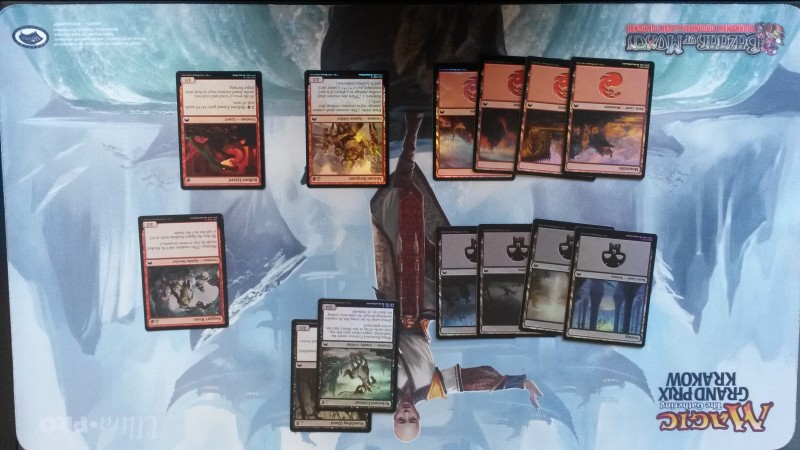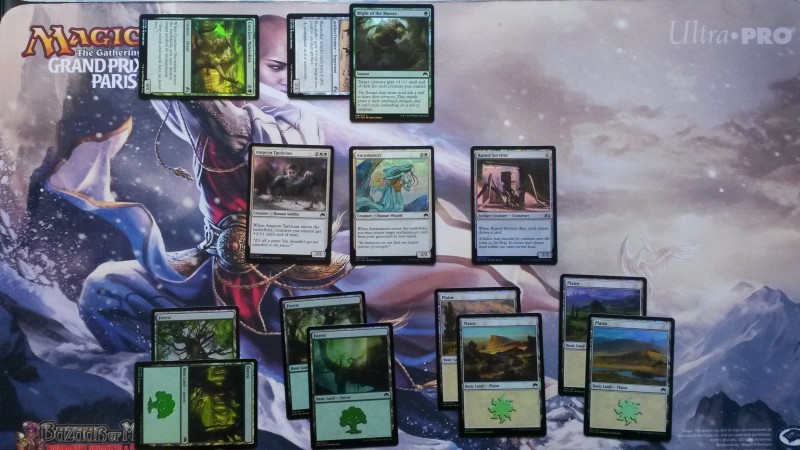There are a few situations that can severely damage a game despite no player committed an actual infraction. One of the most common is a disagreement on the current game state following a below average, not to say inexistent, communication, while no CPV was committed.
The instinctive reaction: Backing up
In these situations, it is tempting to rewind the game state up to the last moment both players agreed on what happened. However, I’ll be blunt: This almost never works.
- AP attacks with two 3/3 creatures. NAP is at 20 and, silently, moves his own creatures around. At some point, he puts his two 2/2s in front of one of the 3/3s, then stares at AP for a moment.
- AP asks: “Are these your blocks?” NAP doesn’t pronounce a word but, according to AP, makes a small head gesture.
- Interpreting this head movement as a positive answer, AP casts Giant Growth on the double-blocked 3/3.
At which point NAP says: “Wait wait wait… I was still thinking how to block”.
First and even though it’s tempting to believe NAP is dishonest, let’s exclude Cheating from this scenario as this is not the crux of the matter (but if this was your instinctive reaction, kudos! That’s indeed super shady!)
Then, let’s see what a backup to the last point of agreement would look like: NAP is declaring blockers and is not finished. Backing up therefore merely implies cancelling one unique action and putting the Giant Growth back into AP’s hand.
However this means empowering NAP to block with that additional information available. Now, figure out NAP’s options:
- He can make the same block and lose all his creatures.
- He can make one or two single blocks, which are generally very bad.
- Or, with that information and since he doesn’t die to the attack, NAP can simply declare no blockers at all and play the rest of the game around that Giant Growth he has now seen.
What did this backup achieve?
- Did we restore an organic game state or did we corrupt the game even more?
- Which player made the most efforts to communicate clearly?
- Which player benefits the most from a backup?
Simply put, AP is the player who made the biggest effort to communicate. After backing up, AP has revealed an extra card from his hand, giving NAP a crucial strategic information.
Along the lines I’ve defined in Backing up : Philosophy and Methodology, this isn’t a satisfying backup. Not at all.
You need to make a decision!
The aforementioned example is fairly common. Most of the time, the consequences of a backup to “remedy” to miscommunication will look this way. It would be fair to point out that this sole example is biased and there can be situations where backing up will be ok. We’ll touch that later.
However, in these situations , players will often not call the judge because the consequences of the miscommunication are so limited they don’t even care: They’ll just solve it themselves. When you’re called, it means the consequences are fairly important, or at least so important players disagree on how to solve it.
- AP casts Dromoka’s Command to put a +1/+1 counter on Anafenza, the Foremost and fight a face-down creature.
- NAP turns the targeted creature, a Den Protector, face-up, bringing Magma Spray back to his hand.
- Then, while AP takes a die (representing the counter) in his hand and brings it towards Anafenza (players disagree whether the die reached Anafenza or not), NAP places his Den protector into his graveyard.
- Then NAP casts Magma Spray to kill Anafenza, as she has been dealt three damage during the fight.
At that point AP casts Ultimate Price to destroy the Den Protector, pointing out that Dromoka’s Command hasn’t resolved yet since he never put it into his graveyard.
This situation raises many questions:
- Does the fact AP grabbed a die imply the Command resolved?
- What about the fact NAP sent his Den Protector to the graveyard?
- Is the fact the Command is still in the middle of the table a proof it’s still on the stack?
Fancying a backup
The core of the issue is: Has Dromoka’s Command resolved yet? Therefore, the last moment players agreed on something is right after Magma Spray was brought back to NAP’s hand. At that point, Dromoka’s Command is still on the stack.
Therefore, this means that a back up in this situation would actually be 100% equivalent to ruling that Dromoka’s Command hasn’t resolved yet, which is AP’s view on the game state:
Therefore, by deciding to back up, you actually make a ruling in favor of AP, since it allows him to make the play he wanted to do! Again, backing up actually favors one player over the other.
The important thing is not that backing up does favor a player, it is that backing up is often perceived by judges as a fair way to handle miscommunication, while it’s not.
Backing up without assessing who was responsible for the miscommunication is equivalent to making a random decision.
Making a decision
Going back to the aforementioned questions, none of their answers is a proof per se:
- Dromoka’s Command technically remains on the stack until it finished resolving, therefore it’s no proof it can still be responded to.
Also, note that players rarely put their spells at an appropriate place at all times so that’s a technicality you should not rely on. - AP grabbing a die and moving it to Anafenza is a bit of a hint.
- NAP sending his creature to the graveyard is another hint.
As a judge, you have several options here:
- Rule Dromoka’s Command has resolved and Magma Spray is on the stack
- Rule Dromoka’s Command is on the stack and Magma Spray was cast in response
- Rule Dromoka’s Command is on the stack and put Magma Spray back to AP’s hand
Option 1 is making a ruling in favor of NAP, while options 2 and 3 mean making a ruling in favor of AP (with 2 being harsher on NAP).
In Prague, I ruled in favor of NAP for the following reasons:
- AP made an action that kind of implied that the Command was resolving, making me exclude that NAP acted too fast (rushed).
- AP only drew attention to the unclarity in the game state after Magma Spray was cast. He could have cast Ultimate Price either in response to the triggered ability that brought Magma Spray back to hand or before reaching for the die… In a word, he had several opportunities to act earlier. The fact he acts so late made me doubt he was fully aware of what he could do to save Anafenza.
- NAP explained to me how poor a strategy it would be to not let the Command resolve since, unlike a Giant Growth that he would need to cast beforehand to boost his creature, he does not need to cast the Magma Spray until Dromoka’s Command resolved.
Obviously, there is a chance AP has made a strategic mistake here, but this didn’t seem to be the case.
Backups: Handle with caution!
Like I said, backing up is not a no-go. Simply, you need to assess how you believe the situation can be fixed at best and make a decision accordingly. Let’s take one from GP Madrid 2015:
AP attacks with a Ramroller and Conclave Naturalists. NAP double blocks the 4/4 into his two creatures. Then AP casts Might of the masses on the unblocked 4/3.
This is the discussion as it was confirmed by both players:
- NAP, surprised, asks: “On the 4/3?”
- AP answers: “Yes”
- NAP adds: “Are you sure?”
- AP: “Yes”
They resolve combat damage.
- NAP says: “Then… I take 6, your creature dies”
- To which AP says: “No, you take 4, both your creatures die”
NAP claims he verbally indicated he was blocking the 4/4, AP claims he never heard anything. None of them are native English speakers (although decent speakers).
This is how the situation looks like when I arrive at the table:
Since the confusion happened onto which creature was double blocked, in order to backup, you need to rewind until the Declare blockers turn based action, which means allowing AP to cast Might of the masses on the blocked creature. Again, backing up for the sake of backing up totally implies making a ruling in favor of one player.
Both creatures seem to be totally in front of the Ramroller. When challenging NAP on this, he indicates that AP rearranged the position of his creatures after declaring blockers and moved the 4/4 which was on top of the 4/3 on the side to cast Might of the masses:
AP confirmed.
Here are the conclusions I came to when assessing the situation:
- Strategically speaking, it generally makes more sense to double block the 4/4 than the 4/3, especially as the Ramroller has a drawback that can allow another block next turn.
This is only likely, as NAP may want to turn around a boost that would give +X/+1 so as to make sure to kill the 4/3. This didn’t seem to be the case here. - Both players agree on the position of the creatures when blockers were declared. There was potential ambiguity by the positioning alone.
- Except whether a clear statement was made on the fact the 4/4 was the blocked creature, both players agree on pretty much everything they said.
I believe that NAP did indeed block the 4/4, but it was not clear in AP’s mind since he moved the 4/4 away from the two blockers when casting the spell. Supported by the discussion that happened when combat damage resolved, I also believe that AP did cast his spell targeting the double blocked creature. Except both players disagreed on which one it was.
Now, since both players may want to do other choices, I ruled that the 4/4 was double blocked and AP was casting Might of the masses but the target was not yet announced. AP targeted the 4/4 and the game proceeded.
Yes, this is a backup. However, this backup is the consequence of a thorough analysis of the situation rather than a default decision.
Interestingly, the outcome of this backup almost feels like a partial fix, except that both players, who may have been taking actions based on this new situation, had a chance to do so. To that extent, once again, it does follow the lines I’ve defined in Backing up : Philosophy and Methodology.
Keep in mind!
- Backing up for miscommunication is never fair to both. It does favors one!
- One player is likely more responsible than the other for miscommunicating. You should likely not rule in his favor.
- If you believe backing up is the best option, do it as you would backup a GRV!
Kevin Desprez



